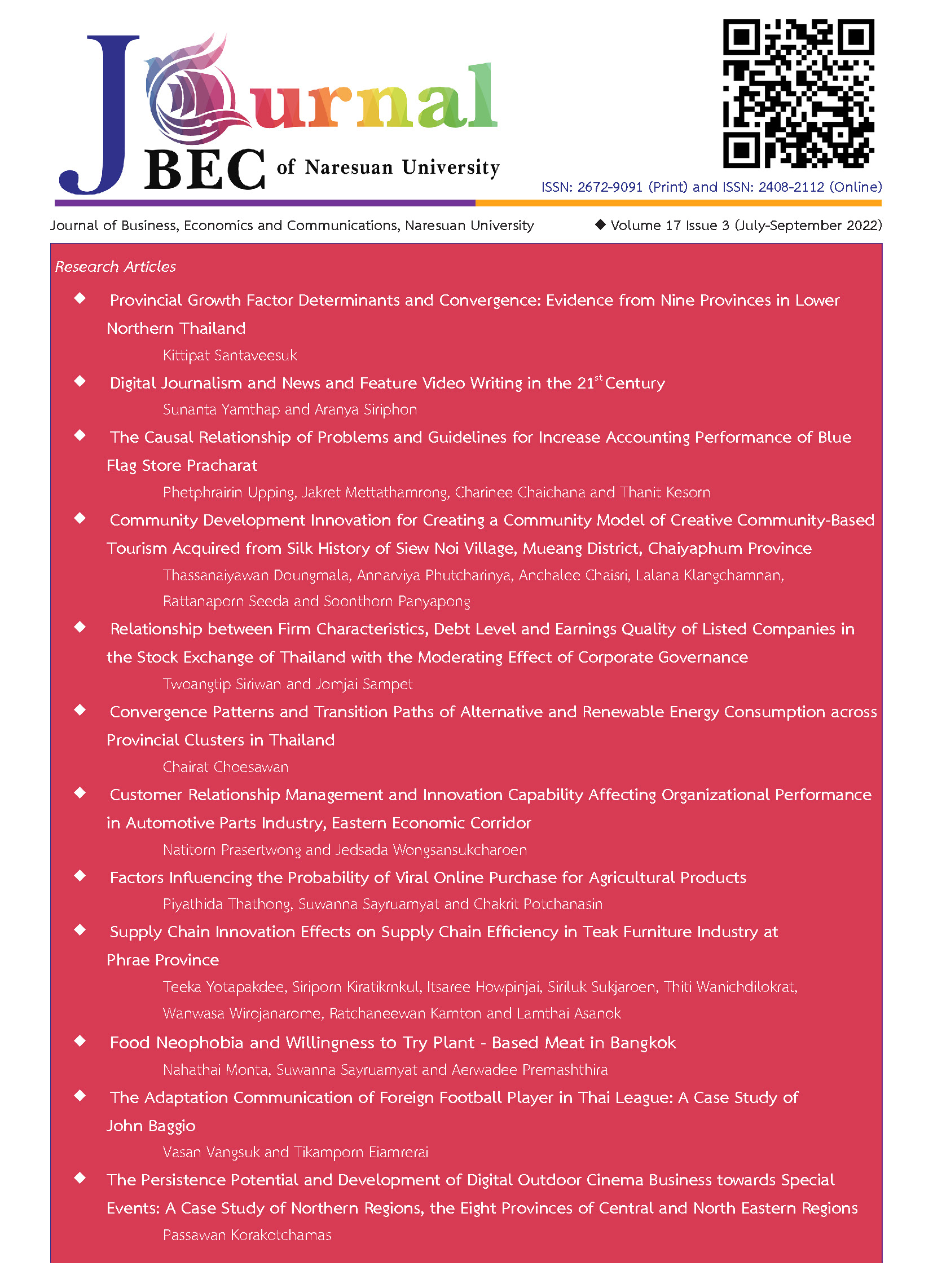Food Neophobia and Willingness to Try Plant - Based Meat in Bangkok
Main Article Content
บทคัดย่อ
This article aims to explore food neophobia and consumers’ willingness to try the product of plant-based meat (PBM). 232 responses were collected via questionnaires. The results demonstrate that the 196 responses (84.4 percent) who are willing to try PBM have a lower food neophobia score (2.3 score) than respondents who were not willing to try the product (3.8 score) Food neophobia effects consumer decision and the group with lower score have higher intention to try PBM. Two-Step Cluster Analysis separates respondents into 4 groups: Meat Lover, Pork Lover, Beef Lover and Red Meat Lover. Meat Lover is not willing to try PBM while other groups reject it. The results indicates that there are consumers interested in and willing to try PBM products. Thus, food entrepreneurs should add PBM menu. It will be an alternative dish for customer and increase profits for food entrepreneurs and the producer should use this data to develop marketing strategies focusing on the group who have willingness to try PBM products.
Article Details

อนุญาตภายใต้เงื่อนไข Creative Commons Attribution-NonCommercial-NoDerivatives 4.0 International License.
เอกสารอ้างอิง
Bryant, C., Szejda, K., Parekh, N., Deshpande, V., and Tse, B. (2019). A survey of consumer perceptions of plant-based and clean meat in the USA, India, and China. Frontiers in Sustainable Food Systems, 3(2), 11-25.
Charoensiriphan, P. (2019). Meat avatar a brand that wants Thai people to eat meat. Retrieved October 10, 2020, from https://adaymagazine.com/meat-avatar/
Faccio, E. and Guiotto, N. L. (2019). Food Neophobia or distrust of novelties? exploring consumers’ attitudes toward GMOs, insects and cultured meat. Applied Sciences, 9(20), 1-10.
Grant, J. and Richter, H. (2019). 2020: The year of the flexitarian. Retrieved September 5, 2020, from https://www.sustainalytics.com/esg-blog/2020-the-year-of-the-flexitarian/
Grasso, A., Hung, Y., Olthof, M. R., Verbeke, W., and Brouwer, I. A. (2019). Older consumers’ readiness to accept alternative, more sustainable protein sources in the European Union. Nutrients, 11(8), 1904.
Hair, J. F., Black, W. C., Babin, B. J., and Anderson, R. E. (2014). Multivariate data analysis. (7th ed.). Essex: Pearson Education.
Hwang, J., You, J., Moon, J., and Jeong, J. (2020). Factors affecting consumers alternative meats buying intentions: Plant-based meat alternative and cultured meat. Sustainability, 12(14), 1-16.
Kamel, S. and Hassan, A. (2006). Assessing the introduction of electronic banking in Egypt using the technology acceptance model. Cases on Electronic Commerce Technologies and Applications, 5(2) 296-320.
Lotrakun, A. (2016). Factors influencing towards core competency of Phranakorn SiAyutthaya Rajabhat university academic staff. Master thesis, M.S., Phranakorn SiAyutthaya Rajabhat University Academic Staff, Phranakorn SiAyutthaya.
Matsumoto, S and Otsuki, T. (2018). Consumer perception of food attributes. United Kingdom: Taylor & Francis Group.
Nakhanithi, N. (2020). Knowledge attitude and plant based meat consumption behavior of Bangkokians. Master thesis, M.M., Mahidol University, Bangkok.
Namugayi, D. (2014). Social and cultural drivers of meat consumption among Mexican-American millennials in Tempe, AZ. Arizona State University, Master of Arts thesis, M.A., Arizona State University, Arizona.
National Statistical Office Thailand. (2017). The 2017 food consumption behavior survey. Frequency in food consumption in each group (pp. 15-16) Bangkok: Statistical Forecasting Division National Statistical Office.
Pliner, P. and Hobden, K. (1992). Development of a scale to measure the trait of food neophobia in humans. Appetite, 19(2), 105-120.
Schwantes, C. (2018). The meat of the matter: using social marketing to influence red meat purchase behaviour. Master of Arts thesis, M.A., Royal Roads University, Canada.
Sirinanthawitthaya, C. (2020). NRF food technology stocks world-class comparable strength. Retrieved October 12, 2020 from https://thunhoon.com/article/230070
Sogari, G. (2015). Entomophagy and Italian consumers: an exploratory analysis. Progress in Nutrition, 17(4), 311-316.
Stewart, A., Gary, A., Sara, D. and Philip, K. (2014). Principles of marketing. (7th ed.). Malaysia: Pearson Education.
The good food institute. (2019). Plant-Based Market Overview. Retrieved August 27, 2020, from https://www.gfi.org/marketresearch
Vou, A. (2019). Europe is going veg. Retrieved September 7, 2020, from https://www.europeandatajournalism.eu/eng/News/Data-news/Europe-is-going-veg
Wolf, C. A., Malone, T., and MCFadden, B. R. (2020). Beverage milk consumption patterns in the United States: Who is substituting from dairy to plant-based beverages?. Dairy Science, 103(12), 11209-11217


